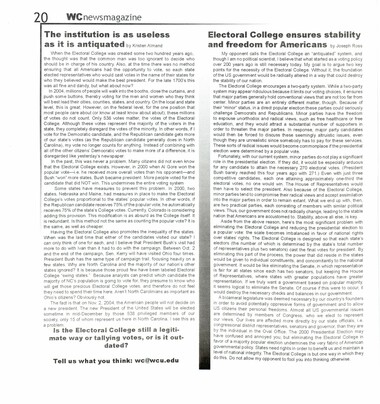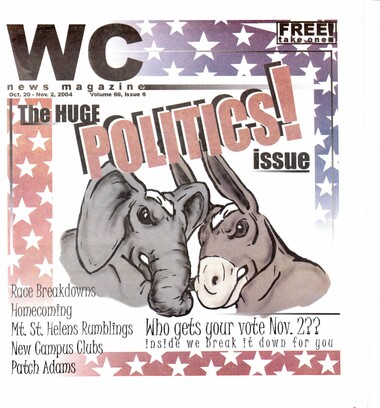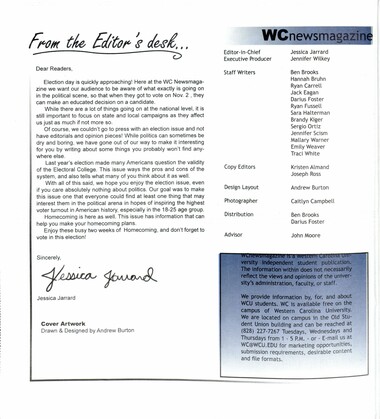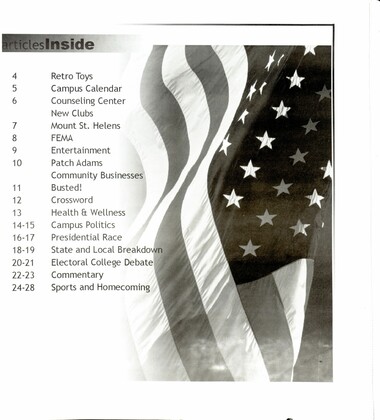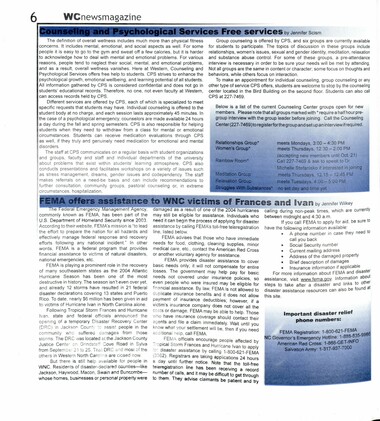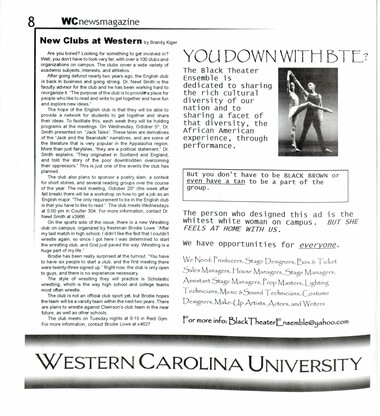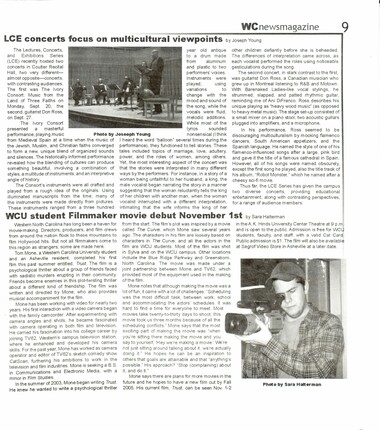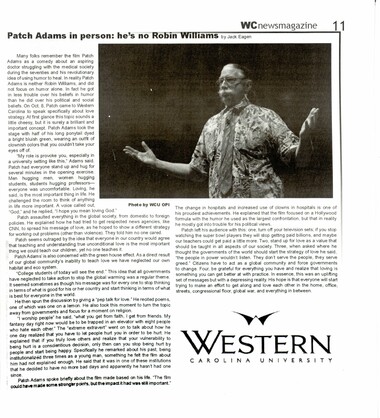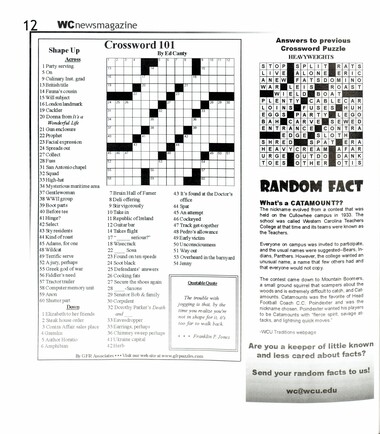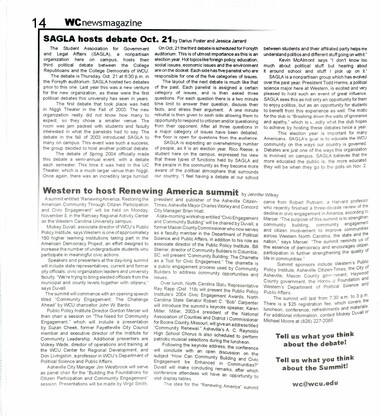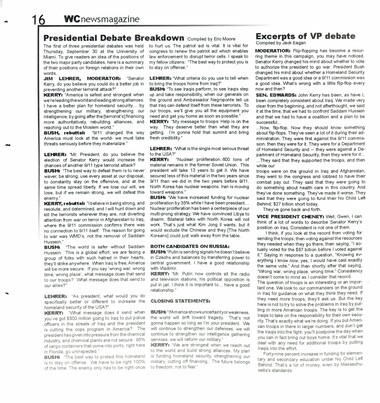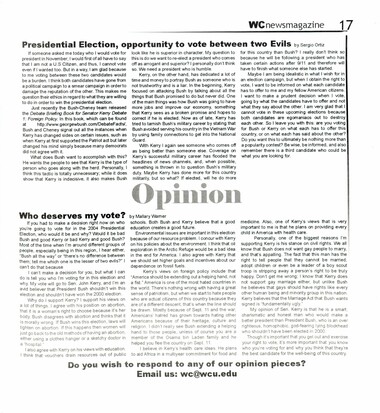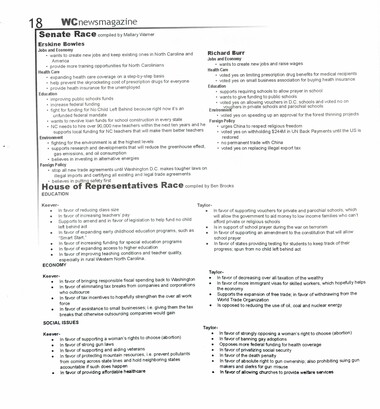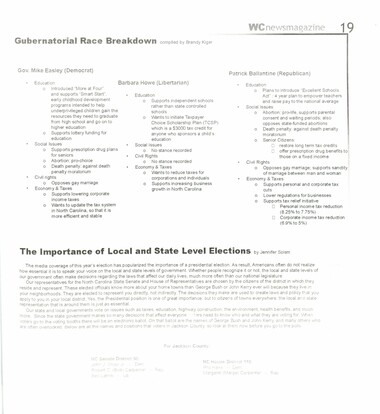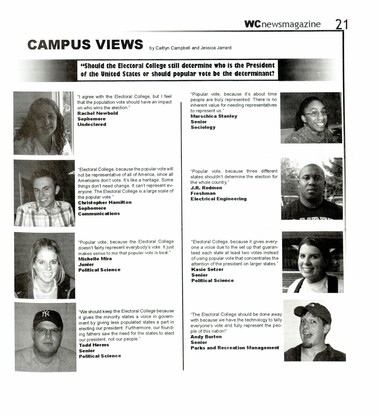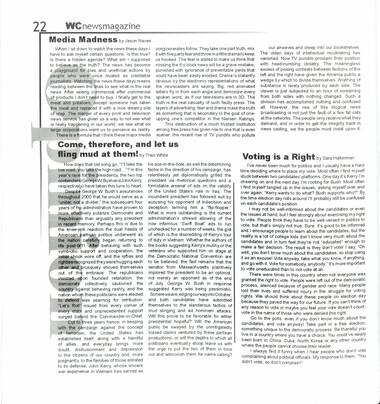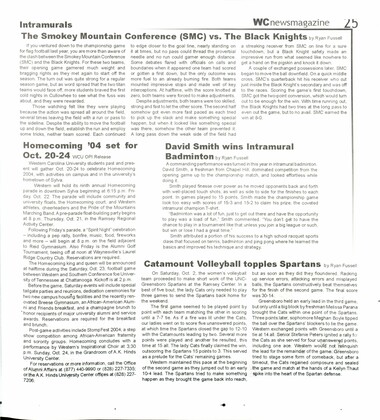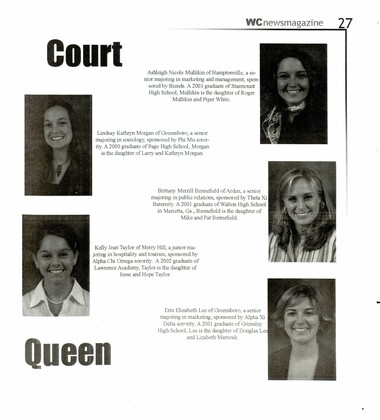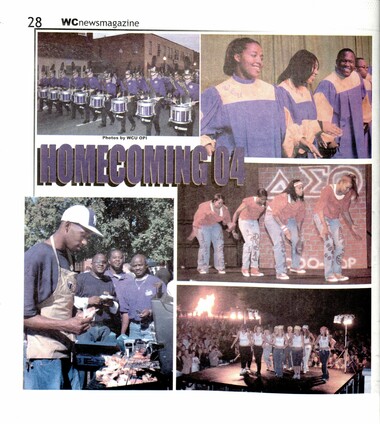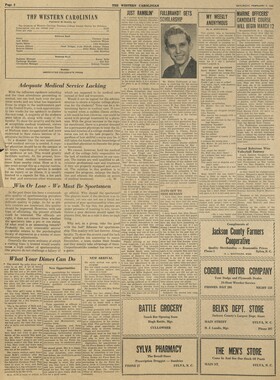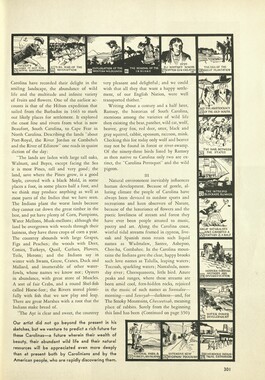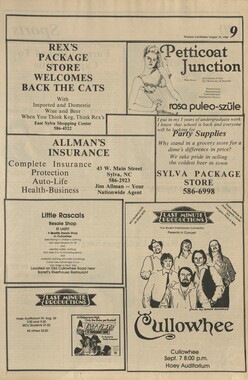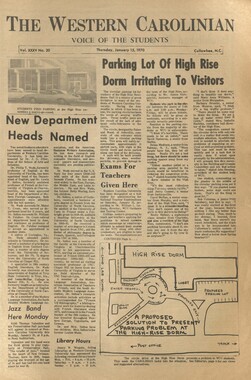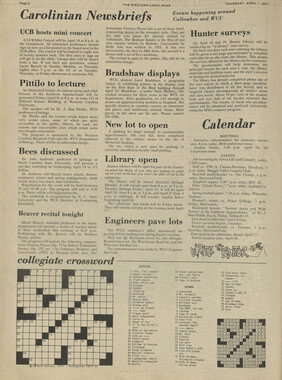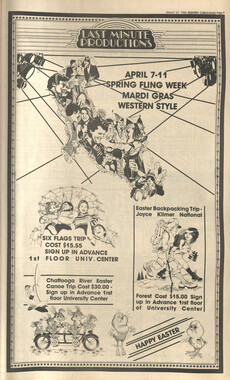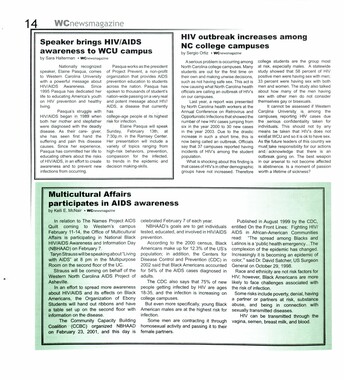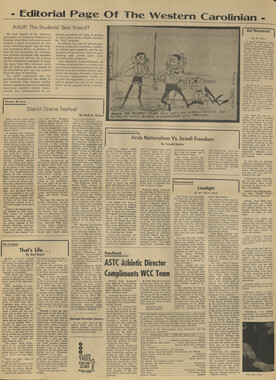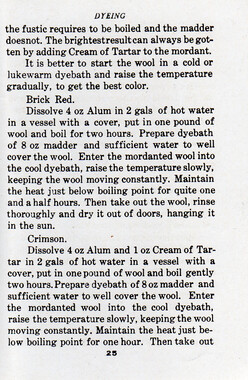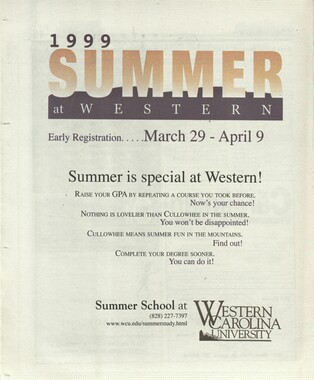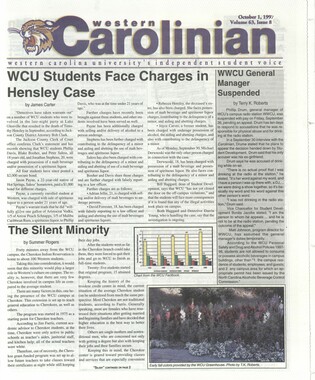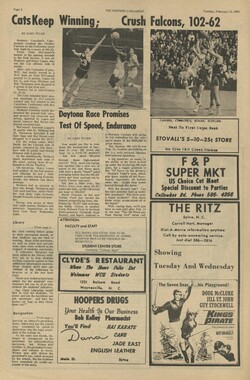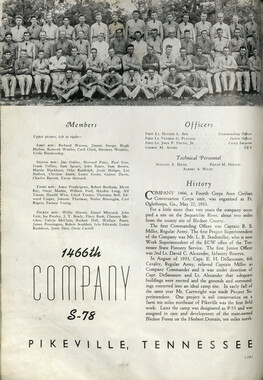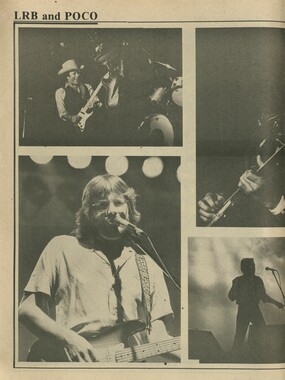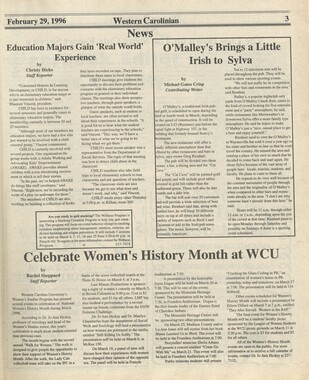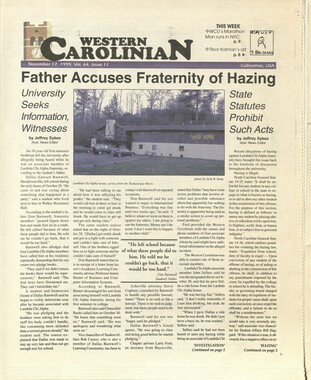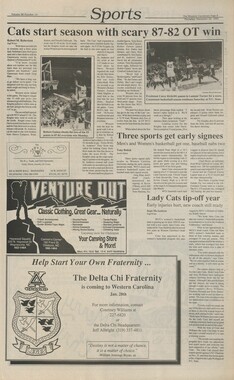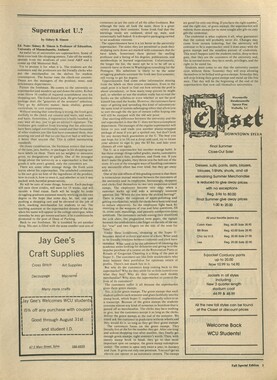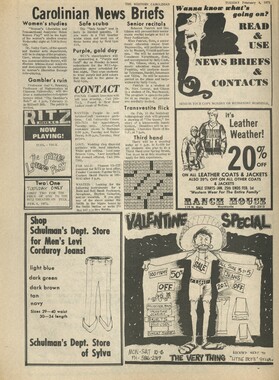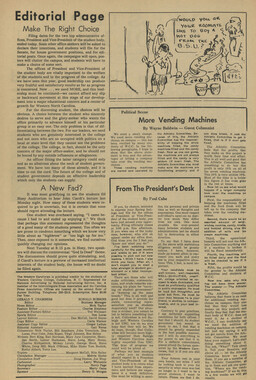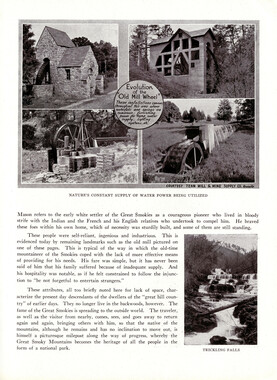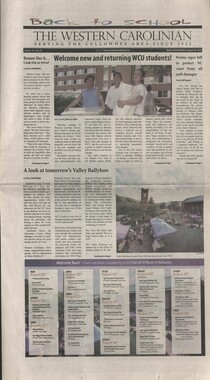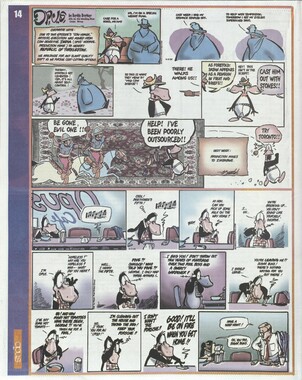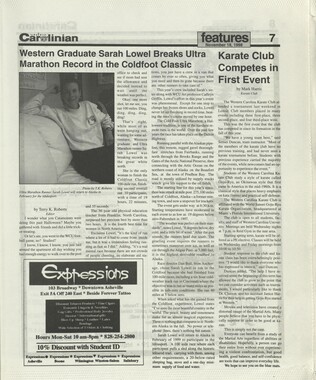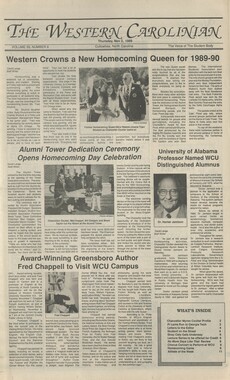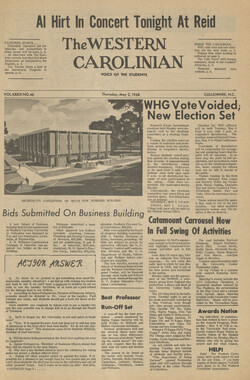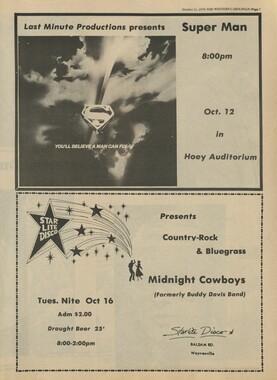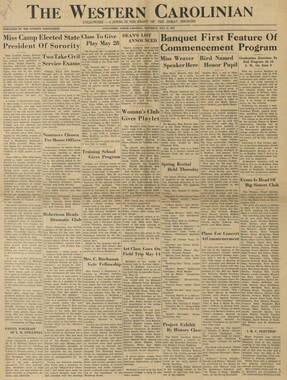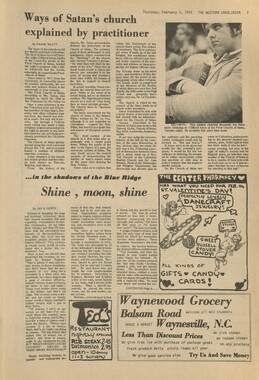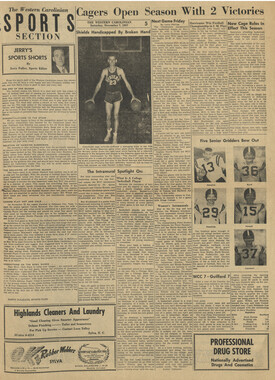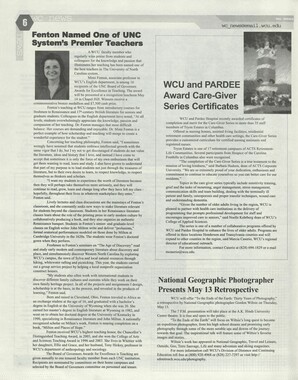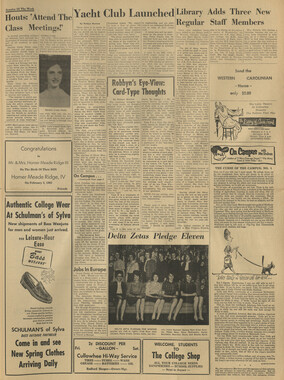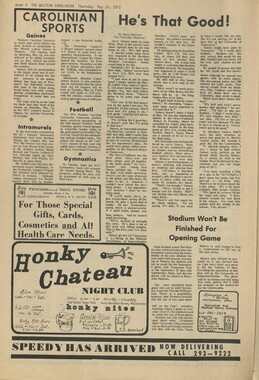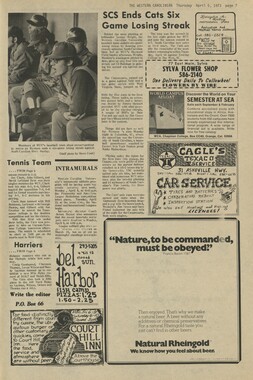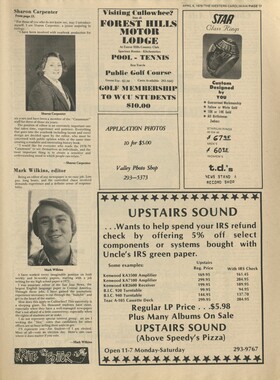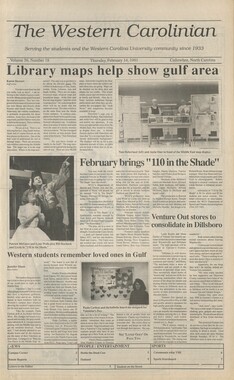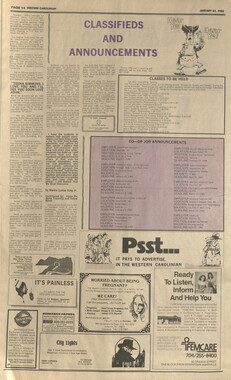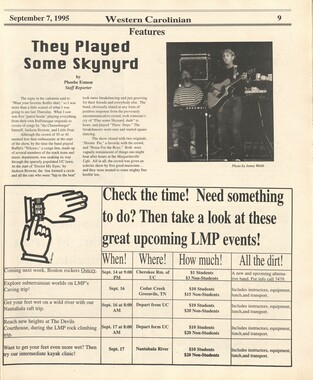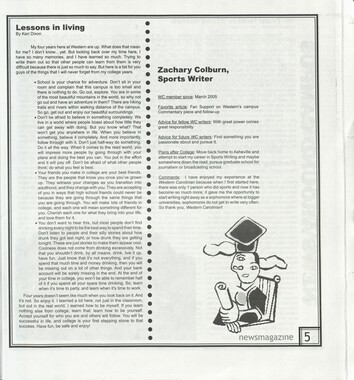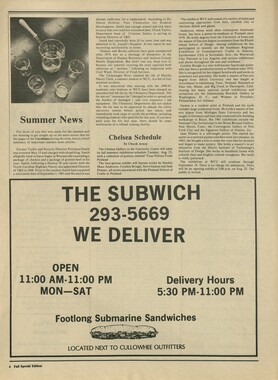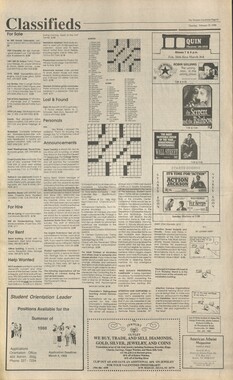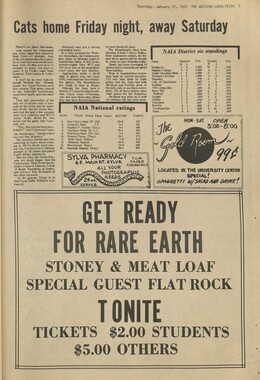Western Carolina University (20)
View all
- Canton Champion Fibre Company (2308)
- Cherokee Traditions (291)
- Civil War in Southern Appalachia (165)
- Craft Revival (1942)
- Great Smoky Mountains - A Park for America (2946)
- Highlights from Western Carolina University (430)
- Horace Kephart (941)
- Journeys Through Jackson (159)
- LGBTQIA+ Archive of Jackson County (85)
- Oral Histories of Western North Carolina (314)
- Picturing Appalachia (6873)
- Stories of Mountain Folk (413)
- Travel Western North Carolina (160)
- Western Carolina University Fine Art Museum Vitreograph Collection (129)
- Western Carolina University Herbarium (92)
- Western Carolina University: Making Memories (738)
- Western Carolina University Publications (2491)
- Western Carolina University Restricted Electronic Theses and Dissertations (146)
- Western North Carolina Regional Maps (71)
- World War II in Southern Appalachia (131)
University of North Carolina Asheville (6)
View all
- Allanstand Cottage Industries (62)
- Appalachian National Park Association (53)
- Bennett, Kelly, 1890-1974 (1463)
- Berry, Walter (76)
- Brasstown Carvers (40)
- Carver, George Washington, 1864?-1943 (26)
- Cathey, Joseph, 1803-1874 (1)
- Champion Fibre Company (233)
- Champion Paper and Fibre Company (297)
- Cherokee Indian Fair Association (16)
- Cherokee Language Program (22)
- Crowe, Amanda (40)
- Edmonston, Thomas Benton, 1842-1907 (7)
- Ensley, A. L. (Abraham Lincoln), 1865-1948 (275)
- Fromer, Irving Rhodes, 1913-1994 (70)
- George Butz (BFS 1907) (46)
- Goodrich, Frances Louisa (120)
- Grant, George Alexander, 1891-1964 (96)
- Heard, Marian Gladys (60)
- Kephart, Calvin, 1883-1969 (15)
- Kephart, Horace, 1862-1931 (313)
- Kephart, Laura, 1862-1954 (39)
- Laney, Gideon Thomas, 1889-1976 (439)
- Masa, George, 1881-1933 (61)
- McElhinney, William Julian, 1896-1953 (44)
- Niggli, Josephina, 1910-1983 (10)
- North Carolina Park Commission (105)
- Osborne, Kezia Stradley (9)
- Owens, Samuel Robert, 1918-1995 (11)
- Penland Weavers and Potters (36)
- Roberts, Vivienne (15)
- Roth, Albert, 1890-1974 (142)
- Schenck, Carl Alwin, 1868-1955 (1)
- Sherrill's Photography Studio (2565)
- Southern Highland Handicraft Guild (127)
- Southern Highlanders, Inc. (71)
- Stalcup, Jesse Bryson (46)
- Stearns, I. K. (213)
- Thompson, James Edward, 1880-1976 (226)
- United States. Indian Arts and Crafts Board (130)
- USFS (683)
- Vance, Zebulon Baird, 1830-1894 (1)
- Weaver, Zebulon, 1872-1948 (58)
- Western Carolina College (230)
- Western Carolina Teachers College (282)
- Western Carolina University (2008)
- Western Carolina University. Mountain Heritage Center (18)
- Whitman, Walt, 1819-1892 (10)
- Wilburn, Hiram Coleman, 1880-1967 (73)
- Williams, Isadora (3)
- Cain, Doreyl Ammons (0)
- Crittenden, Lorraine (0)
- Rhodes, Judy (0)
- Smith, Edward Clark (0)
- Appalachian Region, Southern (2693)
- Asheville (N.C.) (1936)
- Avery County (N.C.) (26)
- Blount County (Tenn.) (195)
- Buncombe County (N.C.) (1672)
- Cherokee County (N.C.) (283)
- Clay County (N.C.) (556)
- Graham County (N.C.) (236)
- Great Smoky Mountains National Park (N.C. and Tenn.) (519)
- Haywood County (N.C.) (3569)
- Henderson County (N.C.) (70)
- Jackson County (N.C.) (4913)
- Knox County (Tenn.) (35)
- Knoxville (Tenn.) (13)
- Lake Santeetlah (N.C.) (10)
- Macon County (N.C.) (420)
- Madison County (N.C.) (215)
- McDowell County (N.C.) (39)
- Mitchell County (N.C.) (132)
- Polk County (N.C.) (35)
- Qualla Boundary (982)
- Rutherford County (N.C.) (76)
- Swain County (N.C.) (2182)
- Transylvania County (N.C.) (270)
- Watauga County (N.C.) (12)
- Waynesville (N.C.) (86)
- Yancey County (N.C.) (72)
- Aerial Photographs (3)
- Aerial Views (60)
- Albums (books) (4)
- Articles (1)
- Artifacts (object Genre) (228)
- Bibliographies (1)
- Biography (general Genre) (2)
- Cards (information Artifacts) (38)
- Clippings (information Artifacts) (191)
- Copybooks (instructional Materials) (3)
- Crafts (art Genres) (622)
- Depictions (visual Works) (21)
- Design Drawings (1)
- Drawings (visual Works) (185)
- Envelopes (73)
- Exhibitions (events) (1)
- Facsimiles (reproductions) (1)
- Fiction (general Genre) (4)
- Financial Records (12)
- Fliers (printed Matter) (67)
- Glass Plate Negatives (381)
- Guidebooks (2)
- Internegatives (10)
- Interviews (815)
- Land Surveys (102)
- Letters (correspondence) (1013)
- Manuscripts (documents) (618)
- Maps (documents) (177)
- Memorandums (25)
- Minutes (administrative Records) (59)
- Negatives (photographs) (6090)
- Newsletters (1290)
- Newspapers (2)
- Notebooks (8)
- Occupation Currency (1)
- Paintings (visual Works) (1)
- Pen And Ink Drawings (1)
- Periodicals (193)
- Personal Narratives (10)
- Photographs (12976)
- Plans (maps) (1)
- Poetry (5)
- Portraits (4568)
- Postcards (329)
- Programs (documents) (181)
- Publications (documents) (2443)
- Questionnaires (65)
- Relief Prints (26)
- Sayings (literary Genre) (1)
- Scrapbooks (282)
- Sheet Music (2)
- Slides (photographs) (402)
- Songs (musical Compositions) (2)
- Sound Recordings (796)
- Specimens (92)
- Speeches (documents) (18)
- Tintypes (photographs) (8)
- Transcripts (322)
- Video Recordings (physical Artifacts) (23)
- Text Messages (0)
- A.L. Ensley Collection (275)
- Appalachian Industrial School Records (7)
- Appalachian National Park Association Records (336)
- Axley-Meroney Collection (2)
- Bayard Wootten Photograph Collection (20)
- Bethel Rural Community Organization Collection (7)
- Blumer Collection (5)
- C.W. Slagle Collection (20)
- Canton Area Historical Museum (2110)
- Carlos C. Campbell Collection (462)
- Cataloochee History Project (64)
- Cherokee Studies Collection (4)
- Daisy Dame Photograph Album (5)
- Daniel Boone VI Collection (1)
- Doris Ulmann Photograph Collection (112)
- Elizabeth H. Lasley Collection (1)
- Elizabeth Woolworth Szold Fleharty Collection (4)
- Frank Fry Collection (95)
- George Masa Collection (173)
- Gideon Laney Collection (452)
- Hazel Scarborough Collection (2)
- Hiram C. Wilburn Papers (28)
- Historic Photographs Collection (236)
- Horace Kephart Collection (861)
- Humbard Collection (33)
- Hunter and Weaver Families Collection (1)
- I. D. Blumenthal Collection (4)
- Isadora Williams Collection (4)
- Jesse Bryson Stalcup Collection (47)
- Jim Thompson Collection (224)
- John B. Battle Collection (7)
- John C. Campbell Folk School Records (80)
- John Parris Collection (6)
- Judaculla Rock project (2)
- Kelly Bennett Collection (1482)
- Love Family Papers (11)
- Major Wiley Parris Civil War Letters (3)
- Map Collection (12)
- McFee-Misemer Civil War Letters (34)
- Mountain Heritage Center Collection (4)
- Norburn - Robertson - Thomson Families Collection (44)
- Pauline Hood Collection (7)
- Pre-Guild Collection (2)
- Qualla Arts and Crafts Mutual Collection (12)
- R.A. Romanes Collection (681)
- Rosser H. Taylor Collection (1)
- Samuel Robert Owens Collection (94)
- Sara Madison Collection (144)
- Sherrill Studio Photo Collection (2558)
- Smoky Mountains Hiking Club Collection (616)
- Stories of Mountain Folk - Radio Programs (374)
- The Reporter, Western Carolina University (510)
- Venoy and Elizabeth Reed Collection (16)
- WCU Gender and Sexuality Oral History Project (32)
- WCU Mountain Heritage Center Oral Histories (25)
- WCU Oral History Collection - Mountain People, Mountain Lives (71)
- WCU Students Newspapers Collection (1923)
- Western North Carolina Tomorrow Black Oral History Project (69)
- William Williams Stringfield Collection (2)
- Zebulon Weaver Collection (109)
- African Americans (390)
- Appalachian Trail (35)
- Artisans (521)
- Cherokee art (84)
- Cherokee artists -- North Carolina (10)
- Cherokee language (21)
- Cherokee pottery (101)
- Cherokee women (208)
- Church buildings (190)
- Civilian Conservation Corps (U.S.) (111)
- College student newspapers and periodicals (2012)
- Dams (107)
- Dance (1023)
- Education (222)
- Floods (61)
- Folk music (1015)
- Forced removal, 1813-1903 (2)
- Forest conservation (220)
- Forests and forestry (1195)
- Gender nonconformity (4)
- Great Smoky Mountains National Park (N.C. and Tenn.) (181)
- Hunting (45)
- Landscape photography (25)
- Logging (119)
- Maps (83)
- Mines and mineral resources (8)
- North Carolina -- Maps (18)
- Paper industry (38)
- Postcards (255)
- Pottery (135)
- Railroad trains (72)
- Rural electrification -- North Carolina, Western (3)
- School integration -- Southern States (2)
- Segregation -- North Carolina, Western (5)
- Slavery (5)
- Sports (452)
- Storytelling (243)
- Waterfalls -- Great Smoky Mountains (N.C. and Tenn.) (66)
- Weaving -- Appalachian Region, Southern (280)
- Wood-carving -- Appalachian Region, Southern (328)
- World War, 1939-1945 (173)
Western Carolinian Volume 69 Number 06
Item
Item’s are ‘child’ level descriptions to ‘parent’ objects, (e.g. one page of a whole book).
-
-
20 WCnewsmagazine The institution is as useless as it is antiquated by Kristen Almand VWhen the Electoral College was created some two hundred years ago, the thought was that the common man was too ignorant to decide who should be in charge of his country. Also, at the time there was no method ensuring that all Americans had the opportunity to vote, so each state elected representatives who would cast votes in the name of their states for who they believed would make the best president. For the late 1700's this was all fine and dandy, but what about now? In 2004, millions of people will walk into the booths, close the curtains, and push some buttons, thereby voting for the men and women who they think will best lead their cities, counties, states, and country. On the local and state level, this is great. However, on the federal level, for the one position that most people care about (or know at least know about about), these millions of votes do not count. Only 538 votes matter, the votes of the Electoral College. Although these votes represent the majority of the voters in the state, they completely disregard the votes of the minority. In other words, if | vote for the Democratic candidate, and the Republican candidate gets more | of our states votes (as the Republican candidate generally does in North | Carolina), my vote no longer counts for anything. Instead of combining with all of the other citizens Democratic votes to make more of a difference, itis | disregarded like yesterdays newspaper. In the past, this was never a problem. Many citizens did not even know _ that the Electoral College exists. However, in 2000 when Al Gore won the popular vote.e. he received more overall votes than his opponentand Bush won more states, Bush became president. More people voted for the candidate that did NOT win. This undermines the entire voting system Some states have measures to prevent this problem. In 2000, two states, Nebraska and Maine, had measures in place to make the Electoral _ College's votes proportional to the states popular votes. In other words, if _ the Republican candidate receives 75% of the popular vote, he automatically receives 75% of the states College votes. Currently, Colorado is considering adding this provision. This modification is as absurd as the College itself. It is redundant. Is this method not the same as counting the popular vote? It is the same, as well as cheaper. Having the Electoral College also promotes the inequality of the states. Vhen was the last time that either of the candidates visited our state? | can only think of one for each, and | believe that President Bushs visit had more to do with Ivan than it had to do with the campaign. Between Oct. 2 and the end of the campaign, Sen. Kerry will have visited Ohio four times. President Bush has the same type of campaign trail, focusing heavily on a few states. Why are North Carolina and the majority of our nations other states ignored? It is because those proud few have been labeled Electoral College swing states. Because analysts can predict which candidate the majority of NCs population is going to vote for, they presume to know who will get those precious Electoral College votes, and therefore do not feel they need to spend their time here. Aren't North Carolinians as important as Ohio's citizens? Obviously not. The fact is that on Nov. 2, 2004, the American people will not decide on a new president. The new President of the United States will be elected sometime in mid-December by those 538 privileged members of our society, only 15 of whom represent us here in North Carolina. | see this as a problem. Is the Electoral College still a legiti- mate way or tallying votes, or is it out- dated? Tell us what you think: wc@wcu.edu Electoral College ensures stability and freedom for Americans y Joseph Ross My opponent calls the Electoral College an antiquated system, and though | am no political scientist, | believe that what started as a voting policy over 200 years ago is still necessary today. My goal is to argue two key points for the necessity of the Electoral College. Without it, the foundation of the US government would be radically altered in a way that could destroy the stability of our nation. The Electoral College encourages a two-party system. While a two-party system may appear ridiculous because it limits our voting choices, it ensures that major parties generally hold conventional views that are not too far from center. Minor parties are an entirely different matter, though. Because of their minor status, in a direct popular election these parties could seriously challenge Democrats and Republicans. Minor parties have the freedom to espouse unorthodox and radical views, such as free healthcare or free education, and they would attract a substantial number of supporters in order to threaten the major parties. In response, major party candidates would then be forced to discuss these seemingly altruistic issues, even though they are unrealistic since somebody has to pay for these services. These sorts of radical issues would become commonplace if the presidential election were determined by a popular vote. Fortunately, with our current system, minor parties do not play a significant role in the presidential election. If they did, it would be especially arduous for any candidate to attain the necessary 270 electoral votes. (President Bush barely reached this four years ago with 271.) Even with just three competitive candidates, each one attaining approximately one-third the electoral votes, no one would win. The House of Representatives would then have to select the president. Also because of the Electoral College, minor parties tend to compromise their radical views and accept assimilation into the major parties in order to remain extant. What we end up with, then, are two practical parties, each consisting of members with similar political views. Thus, our government does not radically change, leading to the stable nation that Americans are accustomed to. Stability, above all else, is key. Aside from the above reason, heres the most significant problem with eliminating the Electoral College and reducing the presidential election to a popular vote: the scale becomes imbalanced in favor of national rights over states rights. The Electoral College is designed so that each states electors (the number of which is determined by the states total number of representatives plus two senators) cast the final votes for president. By eliminating this part of the process, the power that did reside in the states would be given to individual constituents, and concomitantly to the national government. It would be like eliminating the Senate, in which representation is fair for all states since each has two senators, but keeping the House of Representatives, where states with greater populations have greater representation. lf we truly want a government based on popular majority, it seems logical to eliminate the Senate. Of course if this were to occur, it would destroy the necessary checks and balances in our government. . A bicameral legislature was deemed necessary by our countrys founders in order to avoid potentially oppressive forms of government and to allow US citizens their personal freedoms. Almost all US governmental issues are determined by members of Congress, who we elect to represent Our views. Our lives are affected more directly by our state officials, i.e. congressional district representatives, senators and governor, than they are by the individual in the Oval Office. The 2000 Presidential Election may have confused and annoyed you, but eliminating the Electoral College in favor of a majority popular election undermines the very fabric of American governmental policy. States need rights in order to benefit us and maintain a level of national integrity. The Electoral College is but one way in which they do this. Do not allow my opponent to fool you into thinking otherwise.
Object
Object’s are ‘parent’ level descriptions to ‘children’ items, (e.g. a book with pages).
-
The Western Carolinian is Western Carolina University's student-run newspaper. The paper was published as the Cullowhee Yodel from 1924 to 1931 before changing its name to The Western Carolinian in 1933.
-
